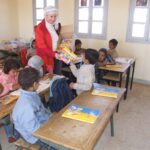On August 24th, in the northern region of Burkina Faso, specifically in Barsalogho, a group of jihadists carried out a massacre that resulted in the deaths of numerous farmers. It is estimated that the number of victims could reach up to four hundred people. The attackers, presumably affiliated with al-Qaeda, assaulted using Kalashnikov rifles while traveling on motorcycles along the dry tracks of the Sahel. The farmers were struck while digging defensive trenches, as ordered by the government. This tragic event is one of the most devastating to occur in Burkina Faso, a poor country that has been torn apart for years by a destabilizing war fueled by various terrorist groups. The conflict has already caused over eleven thousand deaths since Captain Ibrahim Traoré took power in a coup nearly two years ago. Just a month earlier, Mali experienced a similar tragedy. In Tinzawaten, near the Algerian border, separatist rebels killed dozens of Russian mercenaries belonging to the Wagner group, locally known as the Afrika Corps. This, too, was an unprecedented loss for the Russian organization in Africa. The decision to withdraw French troops, made by Mali, Burkina Faso, and Niger after a long and unsuccessful intervention, was supposed to mark the beginning of a new era for these countries led by military regimes. However, the results have fallen far short of expectations. The notion that the jihadist threat could be eliminated simply by replacing French soldiers with Russian mercenaries has proven to be flawed. Today, the governments of these three states find themselves in a stalemate. The military juntas have failed to fulfill their commitment to return to civilian life. The transition announced by Colonel Assimi Goïta, leader of Mali and the first to stage a coup, is now two years behind schedule, and elections seem like a distant mirage. Mali is facing a predictable authoritarian drift: several political leaders are imprisoned, civil society has been weakened, and press freedom is in decline. Military forces are regularly accused of killing civilians. The African nationalism to which the young officers in power in the Sahel appeal has led to a break with both the former colonial power and the regional organization Ecowas, which is seen as too close to Paris. For this reason, the new governments have formed the Sahel States Alliance, but without achieving tangible results. Meanwhile, Russia has consolidated its influence in the region, so much so that Goïta has called it a “sincere ally.” The Russians have exploited anti-French sentiment by offering their support to the new military regimes, without, however, solving the problems plaguing the Sahel. The break from French influence does not represent an immediate solution to the issues related to development, security, and political governance. An interesting experience to observe is that of Senegal, where sovereigntists have come to power through democratic elections. This could prove to be a turning point, as the new government is considered legitimate, and Senegal is one of the most important countries in West Africa. The success or failure of this government will have an impact on the entire region. In the meantime, the populations of the Sahel continue to be crushed between the jihadist threat and the authoritarianism of military governments. The near future, unfortunately, looks bleak. Our organization has been operating in the Sahel for over 20 years, and never before have we witnessed such a severe situation. Currently, we can only continue our projects thanks to collaboration with local associations and partners, as the physical presence of our operators has become too dangerous.


